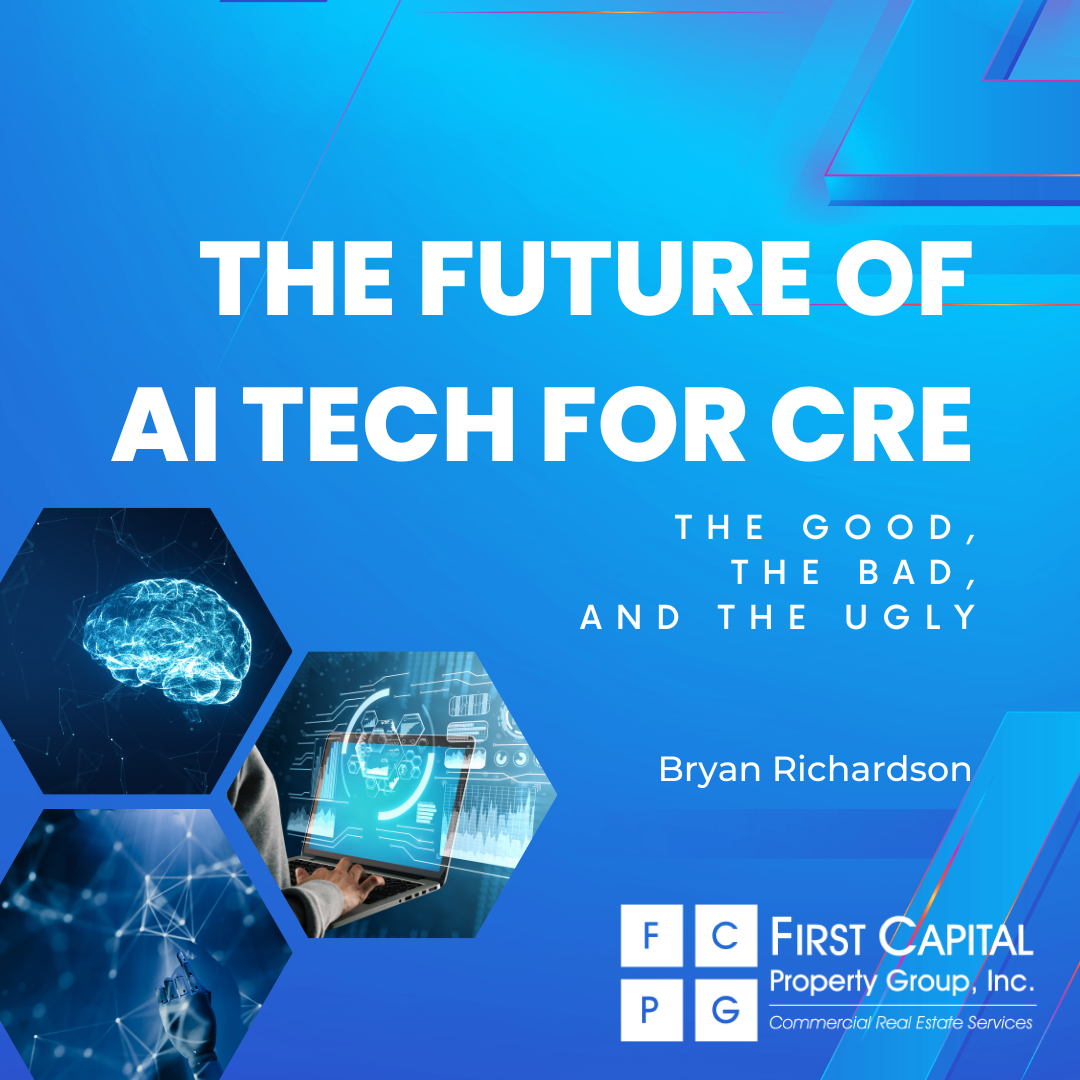The Future of AI Tech for CRE: The Good, the Bad, and the Ugly
Spend any time watching the news or browsing social media and you will inevitably see how AI technology, especially large language models like ChatGPT, are transforming many aspects of our lives and every industry imaginable — from screenwriting for television and film, to art and graphic design, to financial services and commercial real estate. In this post, we will explore the good, the bad, and the ugly aspects of AI technology for the future of commercial real estate brokers to understand the opportunities and challenges that AI presents.
The GOOD
One of the most significant benefits of AI technology for brokers in commercial real estate is automation. AI-powered tools and technologies are automating many of the routine tasks that brokers currently perform. This means that brokers can focus on more complex tasks that require human expertise, such as negotiating deals, providing personalized service, and building long-term relationships with clients. Automation can save brokers time and resources, allowing them to focus on what they do best – serving clients.
Another benefit of AI in commercial real estate is data analysis. AI technology allows brokers to access and analyze vast amounts of data on properties and markets, allowing them to make more informed decisions and provide more accurate valuations to their clients. For example, real-time data on market trends, property prices, and demographic changes can help brokers identify opportunities and assess risk. Additionally, AI can help brokers to identify patterns and trends in data that would be difficult or impossible for humans to detect, providing them with valuable insights that can inform their decision-making.
AI-powered virtual reality (VR), augmented reality (AR), and mixed-reality (MR) tools are also transforming the way brokers showcase properties to potential buyers and tenants. These tools provide an immersive and interactive way to show properties, giving potential clients a more realistic view of the property and its features. For instance, VR can create 3D property tours, allowing clients to explore a property as if they were physically present, while AR can overlay information about a property’s features and amenities, providing clients with a more detailed understanding of what the property has to offer.
The BAD
Despite the many benefits of AI technology, there are some potential negative impacts for brokers in commercial real estate. One of the most significant risks, and one many people may not be aware of, is the potential for bias in AI systems. AI technology relies on algorithms and data to make decisions, and if the data is biased, the system will be biased as well. This can result in inaccurate valuations or recommendations, which could harm both the broker and the client.
Additionally, AI-powered chatbots may not be able to handle complex queries or understand the context of a conversation. This can lead to misunderstandings and frustration for customers trying to inquire about a property or potentially damaging miscommunications with clients.
Another potential negative impact is the risk of replacing human brokers with AI technology. While AI technology can provide efficiency and accuracy in certain areas, it cannot replicate the personal connection and expertise that effective brokers provide. Real estate is a complex and nuanced industry that requires a deep understanding of market trends, property valuation, and negotiations. Human brokers have the experience and knowledge to provide customized solutions to their clients, something that AI technology cannot fully replicate.
The UGLY
The use of AI technology in commercial real estate raises ethical concerns around data privacy. AI technology relies on data, and the use of personal data by AI systems must be carefully regulated to protect the privacy of clients. Brokers who adopt AI technology must ensure that they are following all data privacy laws and regulations to avoid any legal repercussions.
Another potential problem that may arise from AI is it may lead to worsening existing inequalities in the industry. AI systems may reinforce biases in the data they use, leading to discrimination against certain groups. An example of this is the use of automated property valuations. AI systems may use data sets that reflect existing biases in the market, such as the historical undervaluation of properties in certain neighborhoods or the exclusion of certain demographics from the market.
For instance, a study by the Urban Institute found that errors in automated valuation models (AVMs) compared to actual sales prices of homes in majority-black communities were significantly larger than in majority-white neighborhoods. This type of bias can perpetuate existing inequalities in the real estate market, making it more difficult for underrepresented groups to access affordable housing and build wealth through property ownership.
To make matters worse, brokers who have access to advanced AI technology may have an unfair advantage over those who do not, potentially widening the gap between larger and smaller brokerage firms. That is why it is essential for brokers to educate themselves on how to use tools such as ChatGPT to better position themselves to compete with the big CRE firms that are already using it.
Does the Good Outweigh the Bad (And the Ugly)?
AI technology presents both opportunities and challenges for the future of commercial real estate for brokers. While the benefits of AI in automation, data analysis, and showing properties are clear, the risks of bias, replacing brokers’ expertise, and data privacy concerns must be carefully managed.
Brokers who adopt AI technology must ensure they are using AI responsibly to avoid negative impacts on their clients and the industry as a whole. Additionally, while AI technology can help with efficiency and accuracy in certain areas, it cannot fully replace the relational capital and expertise that brokers build over the long-term working with their clients.
Ultimately, the key to success for brokers in an AI-driven world will be to strike a balance between leveraging the benefits of AI technology while maintaining the human element that makes the commercial real estate industry unique.
(This article was written with the help of AI)

